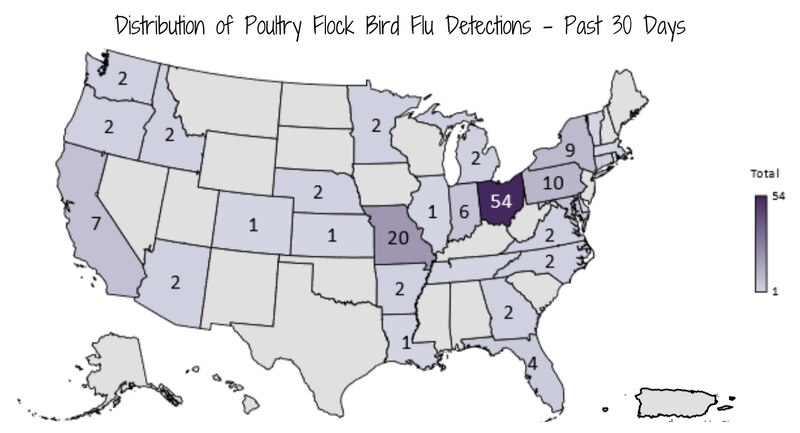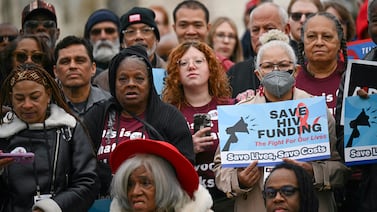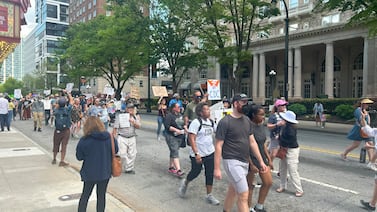Sign up for Your Local Epidemiologist New York and get Dr. Marisa Donnelly’s community public health forecast in your inbox a day early.

A lot is unfolding at the national level, including the recent firing of hundreds of federal health agency employees. Among those laid off were seven Centers for Disease Control and Prevention employees assigned to the New York City health department.
Public health departments in cities across the country (and especially large cities like New York) rely on CDC resources and staff to complete essential public health functions. When these positions are abruptly cut, it weakens the system—leaving gaps that can make us more vulnerable to emerging health threats. But, there are still many ways states can maintain strong systems. That’s because public health is largely local—states have constitutional authority to enact and implement policies that protect the health, safety, and rights of their residents.
This week alone, four major events highlighted this invisible state shield in action. Here’s what happened and why it matters to you.
1. Ebola quickly ruled out in New York City scare
On Sunday morning, two people seeking care at a New York City urgent care were transported to a hospital after fearing they had Ebola. This isn’t completely out of the realm of possibility given that an Ebola outbreak is underway in Uganda. New York is just a flight away, and communications have been frozen between the CDC and the World Health Organization. The United States doesn’t have clear visibility into global health threats.
However, within hours, it was confirmed that the patients did not have exposure to or a diagnosis of Ebola. Instead, they were treated for another health issue. New York is among the most prepared states when it comes to handling highly infectious diseases, like Ebola or Marburg. City hospitals train year-round, running drills and exercises to ensure they can quickly identify, isolate, and safely transport patients with potential of high-risk infections.
2. New York detected the new mpox virus for the first time
New York recently identified its first case of mpox clade I (fourth in the United States)—an important indicator that our disease tracking systems are working. This strain of mpox is notable because it has historically been associated with more severe disease, and is causing an outbreak in Central Africa.
A crucial part of this system is ensuring that doctors know the signs and symptoms to look out for and when to involve public health. The New York State Department of Health and NYC DOHMH periodically release health advisories to prepare clinicians and give them a heads-up on what to look out for.
The case identification followed New York’s strong infectious disease surveillance system:
- The doctor was prepared and noticed this patient had signs and symptoms of mpox virus and a travel history to a country with an ongoing outbreak, increasing the suspicion that this patient had mpox.
- The doctor alerted the public health department, which recommended mpox testing and providing safety precautions for the physician and patient to prevent transmission.
- The patient began isolating while recovering to prevent transmission to others.
- The public health department contacted the CDC for guidance and to facilitate testing.
- Contact tracing and follow-up began and are ongoing while the patient recovers. So far, there have been no other mpox cases, and risk to the general public remains low.
3. A new Global Health Report
On Jan. 30, New York state started publishing a weekly Global Health Update Report. The report is unique—I’ve never seen another state publish a report on international infectious disease trends. It’s a challenge for most states to even maintain local data dashboards due to limited resources.
This weekly report summarizes domestic and international infectious disease outbreaks. Considering that New York City is one of the most internationally connected cities, staying aware of global health issues is particularly important for our state.

4. New York further protects doctors who prescribe abortion medication across state lines
Last week, Gov. Kathy Hochul signed new legislation to protect New York doctors from getting pulled into the crossfire of states’ abortion rights. The new law allows New York doctors to request pharmacies print their practice’s name and address, instead of the doctor’s personal information, on prescription abortion medication (mifepristone and misoprostol).
Wait, isn’t abortion legal and protected in New York?
Yes, in New York:
- People of all ages have the absolute right to abortion through the 24th week of pregnancy.
- After 24 weeks, abortion is permitted if a medical provider determines there are significant risks to the health of the pregnant person or fetus.
So, if abortion is protected in New York, why do we need this new law for abortion medication?
Put simply, to protect New York doctors from other states’ laws.
Following the overturn of Roe v. Wade, 19 states put abortion bans into effect. For those living in these restrictive states (more than half of women aged 18-49 in the United States), telehealth is filling in gaps in reproductive health care access.
Doctors in New York—and other states with reproductive health care protections—have been providing medical care, including prescribing abortion medications, to patients in restrictive states. These efforts have been critical for people who might otherwise struggle to access abortion care. To safeguard these providers, New York passed a telehealth shield law in 2023, protecting health care practitioners from legal actions by states that criminalize abortion. That protection is now being put to the test.
Louisiana and Texas, two states with near-total abortion bans, are targeting a doctor in New York who prescribed abortion medication to patients in their states. Louisiana—where doctors can face up to 15 years in prison, $200,000 in fines, and lose their medical licenses for prescribing abortion pills—has filed criminal charges against a doctor and is attempting to extradite her for trial. In response, Hochul made it clear that New York would not cooperate with the extradition.
In the wake of these charges, New York has taken further action with the new law. Allowing doctors to omit their personal names from abortion medication prescriptions will prevent states like Louisiana and Texas from identifying and targeting providers. This law strengthens New York’s existing shield laws and reinforces the state’s commitment to being a safe haven for reproductive health care. In New York, patients and providers will continue to be protected.
This case will be something to watch. States with dramatically different reproductive rights laws are clashing, and this has the makings of a case that will likely make it to the Supreme Court.
Bottom line
State laws don’t just shape health policy—they act as shields, protecting patients and providers when federal policies fall short. Whether it’s emerging infectious disease threats or reproductive rights, New York is showing how states can be frontline defenders of public health.
Love,
Your Local Epidemiologist
Dr. Marisa Donnelly, a senior epidemiologist with wastewater monitoring company Biobot Analytics, has worked in applied public health for over a decade, specializing in infectious diseases and emerging public health threats. She holds a PhD in epidemiology and has led multiple outbreak investigations, including at the California Department of Public Health and as an Epidemic Intelligence Service Officer at the Centers for Disease Control and Prevention. Marisa has conducted research in Peru, focusing on dengue and Zika viruses and the mosquitoes that spread them. She is Healthbeat’s contributing epidemiologist for New York in partnership with Your Local Epidemiologist, a Healthbeat supporter. She lives in New York City. Marisa can be reached at mdonnelly@healthbeat.org.







